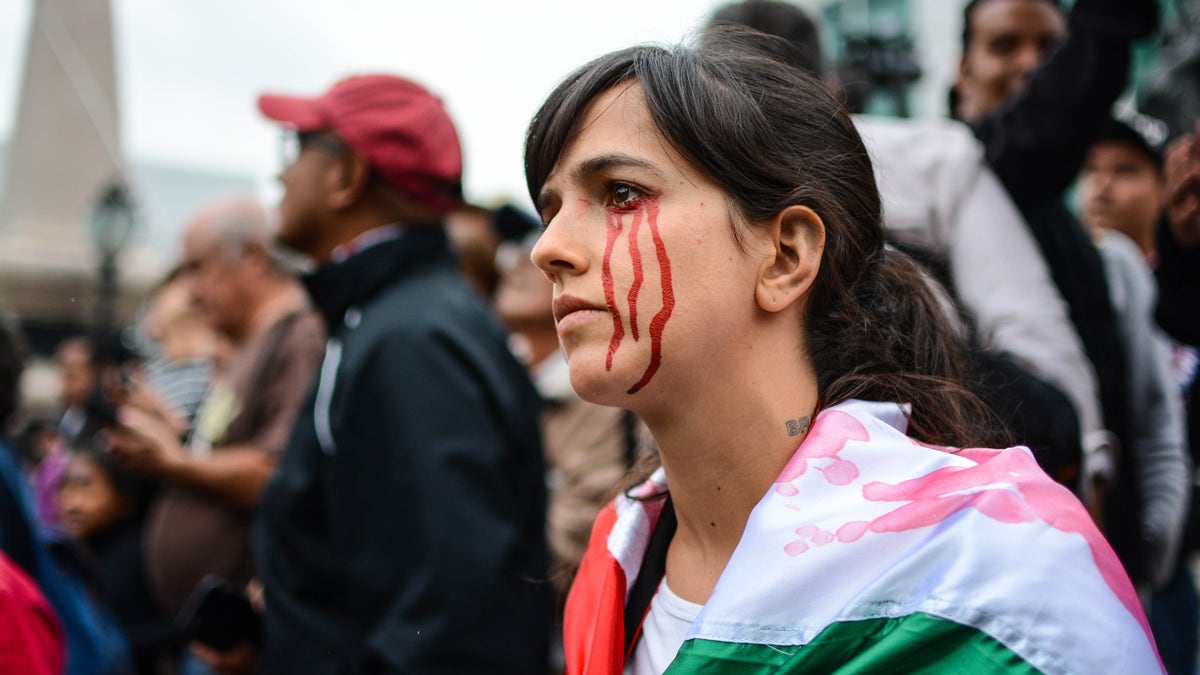
(Jan-Albert Hootsen/ Fox News Latino)
MEXICO CITY, Mexico – Aristeo González looks much older than he should at 49. Early morning on Saturday, he coughed and sighed almost every time he spoke. “It's been hard for us,” he told Fox News Latino, apologetically. “Very hard.”
A farmer from the southern state of Guerrero, González has aged quickly since his two sons – Jorge Luis, 21, and Dorian, 19 – disappeared a year ago in the city of Iguala.
They were two of the 43 students of the Ayotzinapa teachers' college students who vanished the night of Sept. 26, 2014, shortly after they hijacked buses that were to transport them to a protest march against education reform several days later but vanished after they were attacked by municipal police.
Saturday in Mexico City, González and dozens of other parents of the missing students marched defiantly at the front of a protest rally to commemorate the anniversary of the tragedy and to demand justice from a government perceived to be either unable or unwilling to solve what many consider to be the greatest crime in Mexico's modern history.
The parents were accompanied by tens of thousands of supporters who braved an afternoon downpour to show their solidarity, carrying photos of the students and banners demanding justice and the resignation of President Enrique Peña Nieto.
- Mexico continues to smolder over 43 missing students
- In Mexico City, 43 missing students honored by teachers college marching band
- In Mexico City, a day of protest, a night of unrest over 43 missing students
- Mexico outraged over 43 missing students, thousands take to the streets in national strike
- Mexico searches for 43 missing students, finds dozens of – other – bodies
- ‘No more narco-elections!’ Mexico elections marred by violence and turf battles
- Mexico’s missing students impacts Acapulco tourism
- Mexico’s ‘other disappeared’ leave a devastating legacy
- A year later, Mexico still remembers the 43 missing students
- How Chapo Guzmán broke out of Mexico’s highest-security federal prison
“You're not alone!” the crowd shouted repeatedly during the more than three-hour march to the Zócalo square in the capital city's historic center.
Organizers billed the protest a “Day of Indignation,” in which ordinary Mexicans could express anger over what many perceive to be a deeply flawed investigation into the disappearance, highlighting both the links between organized crime and municipal authorities as well as the high level of impunity in a country where more than 100,000 people have died in drug violence since 2006.
According to federal authorities, the 43 were abducted by corrupt local police officers on the order of Iguala's mayor and handed over to members of a local gang, Guerreros Unidos, who allegedly killed them and burned their bodies at a nearby landfill and dumped the ashes in a river.
More than a hundred suspects have been detained, including the mayor and his wife, alleged gang members and scores of policemen accused of links with organized crime.
But parents such as González never believed that “historical truth,” as former attorney general Jesús Murillo Karam called it, pointing out flaws in the investigation. They believe their children are still alive, even though a laboratory in Austria identified the DNA of two of the missing students from the ashes the government recovered.
Their stubborn defiance was vindicated in part earlier this month, when investigators from the Inter-American Commission on Human Rights (IACHR) concluded that alleged killers could not have burned the bodies as completely as they were in the time they had to do it. Also, the amount of fuel needed to burn them to that degree would have been unfeasibly large.
“It's good information for us, but bad information for the government”, González told FNL. “They have been lying to us from the start. They kept coming with more and more lies. That was perhaps the hardest thing for us to swallow, but the foreign investigators' conclusions have given us new strength to fight.”
Indeed, while previous rallies over the Iguala case were mostly an expression of anger and desperation, many attending yesterday's mass gathering also expressed hope that the IACHR bombshell may force the federal government to face the thousands of people who disappeared during almost a decade of brutal criminal violence.
Something Peña Nieto has dealt with by stubbornly trying to sweep it under the carpet and out of everyone’s sight. Which is the one thing the families of the students have refused to let happen.
“It feels like we have been given new oxygen”, Maria de Jesús Tlatempa, whose son José Eduardo is among the missing students, told FNL. “The last 12 months have been psychological torture for us, not knowing what happened to our children, and it's the government that tortured us. But now we have hope that there may be a new investigation and that maybe we will finally get real answers.”
During a meeting last Thursday with president Enrique Peña Nieto, the parents presented a list of fresh demands, including that the government set up a special search unit under international supervision.
Peña Nieto's offer of appointing a federal prosecutor to focus exclusively on the Iguala case was categorically rejected by the families.
“For us to move forward it is of vital importance that new institutions are formed to advance the investigation,” Vidulfo Rosales, the families' lawyer who was also present at the meeting, told FNL. “We can no longer work with existing institutions.”
If anything, the parents of the students now feel that they have momentum on their side.
“We feel very supported by public opinion, both in Mexico and abroad,” González told FNL, clenching his fists. “I feel a lot of extra strength to go on now.”
